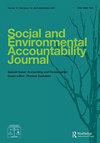创建可见性:KPI作为新冠肺炎大流行中的治理技术
Q2 Business, Management and Accounting
Social and Environmental Accountability Journal
Pub Date : 2023-01-02
DOI:10.1080/0969160X.2023.2175166
引用次数: 0
摘要
Parisi和Bekier(2022)基于“政府心态”的概念,探讨了绩效衡量系统作为政府技术的作用。具体而言,他们关注关键绩效指标(KPI)在评估和管理新冠肺炎对参与创建循环经济型城市的欧洲项目的六个欧洲城市的影响方面的相关性。尽管公民和政府需要参与城市化,以推动人类和我们所依赖的生命支持系统的积极变革(Andersson等人,2014),但缺乏探索城市在可持续发展和循环经济中作用的研究(Lapsley、Miller和Panozzo,2010)(Czarnawska,2010)。本文不仅关注城市作为循环经济的主要驱动力,还对有关会计在危机中的作用的有限文献做出了贡献,如新冠肺炎大流行(Parisi和Bekier 2022)。Parisi和Bekier(2022)专注于会计通过KPI塑造治理实践的能力,以响应项目目标。本文采用了一种定性的方法,包括对每个城市项目负责人的几次采访。他们发现,KPI成为项目经理调整其活动和治理实践并使其适应疫情影响的基准。因此,他们能够实现业绩指标所规定的期望。因此,KPI是一种灵活的工具,有助于设想必要的变化,以实现疫情前设定的目标。除了提到的经验证据外,它们还依赖于关于会计作为一种治理实践的作用以及地方方案适应当前形势的能力的理论论点。最后,他们强调了会计的作用,特别是KPI的作用,这是政府的一项技术,有助于使新冠肺炎疫情变得可计算和可量化。此外,KPI通过创造可见性,使疫情的某些问题具有可计算性和可治理性,有助于代表疫情的影响。因此,他们可以确定不同的干预可能性,同时也可以掩盖其他可能性。本文通过展示会计在治理实践中的作用以及会计帮助评估和本文章由计算机程序翻译,如有差异,请以英文原文为准。
Creating Visibilities: KPIs as a Technology of Governance within Covid-19 Pandemic
Parisi and Bekier (2022) explore the role of performance measurement systems as technologies of government relying on the notion of ‘governmentality’. Specifically, they focus on the relevance of key performance indicators (KPIs) in evaluating and managing the effects of COVID-19 on a sample of six European cities involved in a European project to create circular economy-oriented cities. Despite the need for engaged citizens and governments in redirecting urbanisation to drive a positive change for humanity and the life-supporting systems that we depend upon (Andersson et al. 2014), there is a lack of studies exploring the role of cities (Lapsley, Miller, and Panozzo 2010) in sustainable development and circular economy (Czarniawska 2010). This article not only focuses on cities as the main driver of the circular economy but also contributes to the limited literature concerning the role of accounting in crises, such as the COVID-19 pandemic (Parisi and Bekier 2022). Parisi and Bekier (2022) focus on the capacity of accounting to shape governance practices in response to the project ́s objectives through KPIs. This paper adopted a qualitative method consisting of several interviews with the leaders of each city’s project. They found that KPIs became the benchmark by which project managers adapted their activities and governance practices and transformed them to adapt to the impacts of the pandemic. As a consequence, they were able to achieve the expectations laid out by the performance indicators. Therefore, KPIs were a flexible tool that helped envision the necessary changes to meet the targets set before the pandemic. In addition to the empirical evidence mentioned, they also rely on theoretical arguments on the role of accounting as a governance practice and the capacity of local programmes to adapt to the ongoing situation. They conclude by stressing the role of accounting, particularly of KPIs, as a technology of government that contributed to making the COVID-19 pandemic calculable and quantifiable. Additionally, KPIs helped to represent the effects of the pandemic by creating visibilities, by making certain issues of the pandemic calculable and governable. Therefore, they could identify different possibilities of intervention while also obscuring others. This paper contributes to the existing literature by showing the role of accounting in governance practices and the process by which accounting helps in the evaluation and
求助全文
通过发布文献求助,成功后即可免费获取论文全文。
去求助
来源期刊

Social and Environmental Accountability Journal
Business, Management and Accounting-Accounting
CiteScore
3.90
自引率
0.00%
发文量
16
期刊介绍:
Social and Environmental Accountability Journal (SEAJ) is the official Journal of The Centre for Social and Environmental Accounting Research. It is a predominantly refereed Journal committed to the creation of a new academic literature in the broad field of social, environmental and sustainable development accounting, accountability, reporting and auditing. The Journal provides a forum for a wide range of different forms of academic and academic-related communications whose aim is to balance honesty and scholarly rigour with directness, clarity, policy-relevance and novelty. SEAJ welcomes all contributions that fulfil the criteria of the journal, including empirical papers, review papers and essays, manuscripts reporting or proposing engagement, commentaries and polemics, and reviews of articles or books. A key feature of SEAJ is that papers are shorter than the word length typically anticipated in academic journals in the social sciences. A clearer breakdown of the proposed word length for each type of paper in SEAJ can be found here.
 求助内容:
求助内容: 应助结果提醒方式:
应助结果提醒方式:


